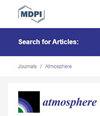极端降水对黄河中游产流产沙的影响
IF 2.5
4区 地球科学
Q3 ENVIRONMENTAL SCIENCES
引用次数: 1
摘要
了解极端降水与径流量和产沙量变化之间的联系,对区域洪涝灾害应对和水土保持决策具有重要意义。本研究调查了1960-2021年黄河中游头道拐-龙门段极端降水(以气候变化检测与指数专家组推荐的10个极端降水指数为特征)的时空分布,并基于偏最小二乘回归(PLSR)。近20年来,极端降水指数呈明显上升趋势,中部和北部地区(上游)的增幅强于南部地区(下游)的增幅。然而,由于黄土高原大规模水土保持措施的实施,径流量和产沙量显著下降,1960-2021年的平均流量分别为9470万m3/a和1330万t/a。径流和产沙变化的变化点出现在1979年。与1960-1979年相比,1980-2021年的径流量和产沙量分别减少了52.7%和70.6%。此外,极端降水对1980-1999年和2000-2021年径流减少的贡献率分别为35.3%和6.2%,对产沙量减少的贡献度分别为84.3%和40.0%。研究表明,近20年来,其他因素(如大规模水土保持建设)对研究区径流量和产沙量的减少起着主要作用。本文章由计算机程序翻译,如有差异,请以英文原文为准。
Effects of Extreme Precipitation on Runoff and Sediment Yield in the Middle Reaches of the Yellow River
Understanding the link between extreme precipitation and changes in runoff and sediment yield is of great significance for regional flood disaster response and soil and water conservation decision-making. This study investigated the spatial and temporal distribution of extreme precipitation (characterized by 10 extreme precipitation indices recommended by the Expert Team on Climate Change Detection and Indices) in the Toudaoguai–Longmen section of the middle Yellow River from 1960 to 2021 and quantified the effects of extreme precipitation on runoff and sediment yield based on the method of partial least squares regression (PLSR). The extreme precipitation index showed an obvious upward trend in the last 20 years, with the increases in the central and northern regions (upstream) being stronger than the increase in the southern region (downstream). However, the runoff and sediment yield decreased significantly due to the implementation of large-scale soil and water conservation measures on the Loess Plateau, with average rates of 94.7 million m3/a and 13.3 million t/a during 1960–2021, respectively. The change points of runoff and sediment yield change occurred in 1979. Compared with those in the period from 1960 to 1979, the reductions in runoff and sediment yield in the years 1980–2021 were 52.7% and 70.6%, respectively. Moreover, extreme precipitation contributed 35.3% and 6.2% to the reduction in runoff in the 1980–1999 and 2000–2021 periods, respectively, and contributed 84.3% and 40.0% to the reduction in sediment yield, respectively. It indicated that other factors (such as large-scale soil and water conservation construction) played main roles in the decrease in runoff and sediment yield in the study area in recent 20 years.
求助全文
通过发布文献求助,成功后即可免费获取论文全文。
去求助
来源期刊

Atmosphere
METEOROLOGY & ATMOSPHERIC SCIENCES-
CiteScore
4.60
自引率
13.80%
发文量
1769
审稿时长
1 months
期刊介绍:
Atmosphere (ISSN 2073-4433) is an international and cross-disciplinary scholarly journal of scientific studies related to the atmosphere. It publishes reviews, regular research papers, communications and short notes, and there is no restriction on the length of the papers. Our aim is to encourage scientists to publish their experimental and theoretical research in as much detail as possible. Full experimental and/or methodical details must be provided for research articles.
 求助内容:
求助内容: 应助结果提醒方式:
应助结果提醒方式:


